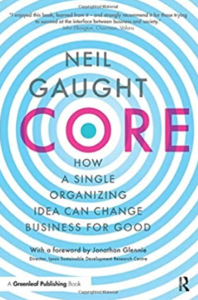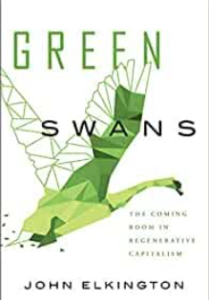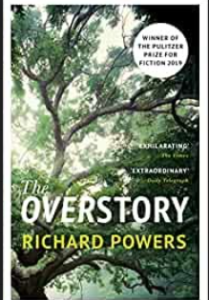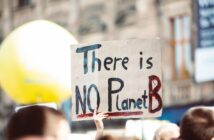Earth Day is an annual event coordinated globally by EARTHDAY.ORG, including 1 billion people in more than 193 countries designed to demonstrate support for environmental protection. As we know, awareness and action aren’t just limited to one day a year, so in the pursuit of ongoing knowledge and wisdom, here are some of the ‘must-have’ sustainability books for your physical or virtual bookshelf.

CORE: How a Single Organizing Idea Can Change Business For Good
Neil Gaught
£29.99, Routledge
Neil Gaught is a leading light amongst a growing number of business thinkers who are saying companies need to quickly and radically change how they operate if they are to meet the demands of customers, employees, and investors increasingly concerned about the sustainability of the planet and society.
With his ground-breaking book ‘CORE’, Neil bolsters the case for a complete rethink of the role of business by proving change is not only unquestionably necessary but entirely possible.
Driven by a single-minded desire to help accelerate progress toward a more sustainable future, Neil is able to draw on unique insights gained as a soldier, designer, strategist, entrepreneur, and writer. His highly informed intuition and interest in understanding what works and what doesn’t have been earned ‘on the ground’ over the past two decades advising both private and public sector organizations of all sizes and across many different sectors in over 50 countries.
CORE is about how businesses can adopt a Single Organizing Idea and, more importantly, why they have to. Its no-nonsense approach sets aside the ideals to confront the realities of business reform. It demonstrates the power and potential that a Single Organizing Idea can bring to any business prepared to take its head out of the sand and proactively respond to today’s challenges.
How to Avoid a Climate Disaster: The Solutions We Have and the Breakthroughs We Need
Bill Gates
£15.99, Allen Lane
In this urgent, authoritative book, Bill Gates sets out a wide-ranging, practical – and accessible – plan for how the world can get to zero greenhouse gas emissions in time to avoid a climate catastrophe.
Bill Gates has spent a decade investigating the causes and effects of climate change. With the help of experts in the fields of physics, chemistry, biology, engineering, political science, and finance, he has focused on what must be done in order to stop the planet’s slide toward certain environmental disaster. In this book, he not only explains why we need to work toward net-zero emissions of greenhouse gases, but also details what we need to do to achieve this profoundly important goal. He gives us a clear-eyed description of the challenges we face.
Drawing on his understanding of innovation and what it takes to get new ideas into the market, he describes the areas in which technology is already helping to reduce emissions, where and how the current technology can be made to function more effectively, where breakthrough technologies are needed, and who is working on these essential innovations. Finally, he lays out a concrete, practical plan for achieving the goal of zero emissions-suggesting not only policies that governments should adopt, but what we as individuals can do to keep our government, our employers, and ourselves accountable in this crucial enterprise.
As Bill Gates makes clear, achieving zero emissions will not be simple or easy to do, but if we follow the plan he sets out here, it is a goal firmly within our reach.
Companies for Good: Living with Modern Capitalism
David Logan
£14.99, Panoma Press
Within Companies for Good experienced corporate responsibility and sustainability practitioner David Logan argues that instead of eliminating companies, we should now accept their contribution to society, but change the law to ensure that with running a business goes the responsibility to help society face the economic, social and especially environmental challenges of the future.
Globally human societies are organically developing social structures based on the work of governments, for-profit and non-profit sectors. Now is the time for private enterprises of the for-profit sector to step forward with the other two formal sectors to help humanity face the challenges of the future. David argues we must actively find ways to bring the power and creativity of private enterprise into positively shaping humanity’s future. Companies for Good considers what this new social contract needs to look like, the importance of values, and how companies and stakeholders can be good citizens.
David Logan is a co-founder of Corporate Citizenship, an international consultancy working on corporate responsibility and sustainability. He has 40 years of impressive practical experience in frontline corporate responsibility and sustainability work in Europe, the US and over 30 emerging markets of Africa, Asia and Latin America. He is a member of the board of the Institute of Corporate Responsibility and Sustainability and an associate of the Centre for Sustainable Business Practices at the University of Northampton.
Naomi Klein with Rebecca Steffof
£12.99, Penguin
The first book for younger readers by internationally bestselling social activist Naomi Klein: the most authoritative and inspiring book on climate change for young people yet. From the Great Barrier Reef to Hurricane Katrina to school environmental policies to Greta Thunberg – climate change impacts every aspect of the world you live in and you have the power to lead the way by enacting change.
Internationally bestselling author of The Shock Doctrine, Naomi Klein, with award-winning children’s science writer Rebecca Stefoff, gives a powerful picture of why and how the planet is changing, providing effective tools for action so that young people really can make a difference. It also includes notes on the COVID-19 pandemic, 2020, and how you can get involved to make the world a safer and better place.
Naomi writes an internationally syndicated column for The Guardian and The Nation and reported from Iraq for Harper’s magazine. In 2004, she released The Take, a feature documentary about Argentina’s occupied factories, co-produced with director Avi Lewis. She is a former Miliband Fellow at the London School of Economics and holds an honorary Doctor of Civil Laws from the University of King’s College, Nova Scotia. Her first book was the international bestseller No Logo: Taking Aim at the Brand Bullies, called “a movement bible” by The New York Times.
A Life on Our Planet: My Witness Statement and a Vision for the Future
David Attenborough
£20, Edbury Press
A Life on Our Planet: My Witness Statement and a Vision for the Future was crafted by documentarian David Attenborough and director-producer Jonnie Hughes. It tells the story of Attenborough’s extraordinary career as a presenter and natural historian against the backdrop of declining wildlife and rising carbon emissions. The book addresses his grave concerns over the effects that climate change and biodiversity loss will have in the future, whilst also offering practical steps to prevent natural disaster. The book acts as a companion to the film, David Attenborough: A Life on Our Planet,
As a young man, David Attenborough felt he was out there in the wild, experiencing the untouched natural world – but it was an illusion. ‘The tragedy of our time has been happening all around us, barely noticeable from day to day – the loss of our planet’s wild places, its biodiversity,’ he explains.
David has been witness to this decline. A Life on Our Planet is his heartfelt witness statement, and his vision for the future. It is the story of how we came to make this, our greatest mistake – and how, if we act now, we can yet put it right. David says, ‘We have one final chance to create the perfect home for ourselves and restore the wonderful world we inherited. All we need is the will to do so.’

Green Swans: The Coming Boom in Regenerative Capitalism
John Elkington
£22.75, Fast Company Press
Even leading capitalists admit that capitalism is broken. Green Swans is a manifesto for system change designed to serve people, planet, and prosperity. In his twentieth book, John Elkington–dubbed the “Godfather of Sustainability”–explores new forms of capitalism fit for the twenty-first century.
If Nassim Nicholas Taleb’s “Black Swans” are problems that take us exponentially toward breakdown, then “Green Swans” are solutions that take us exponentially toward breakthrough. The success–and survival–of humanity now depends on how we rein in the first and accelerate the second.
Green Swans draws on Elkington’s first-hand experience in some of the world’s best-known boardrooms and C-suites. Using case studies, real-world examples, and profiles on emergent technologies, Elkington shows how the weirdest “Ugly Ducklings” of today’s world may turn into tomorrow’s world-saving Green Swans.
This book is a must-read for business leaders in corporations great and small who want to help their businesses survive the coming shift in global priorities over the next decade and expand their horizons from responsibility, through resilience, and onto regeneration.
The Good Ancestor: How to Think Long Term in a Short-Term World
Roman Kraznic
£10.99, WH Allen
From the first seeds sown thousands of years ago, to the construction of the cities we still inhabit, to the scientific discoveries that have ensured our survival, we are the inheritors of countless gifts from the past. Today, in an age driven by the tyranny of the now, with 24/7 news, the latest tweet, and the buy-now button commanding our attention, we rarely stop to consider how our actions will affect future generations. With such frenetic short-termism at the root of contemporary crises, the call for long-term thinking grows every day – but what is it, has it ever worked, and can we even do it?
In The Good Ancestor, leading public philosopher Roman Krznaric argues that there is still hope. From the pyramids to the NHS, humankind has always had the innate ability to plan for posterity and take action that will resonate for decades, centuries, even millennia to come. If we want to become good ancestors, now is the time to recover and enrich this imaginative skill.
The Good Ancestor reveals six profound ways in which we can all learn to think long-term, exploring how we can reawaken oft-neglected but uniquely human talents like ‘cathedral thinking’ that expand our time horizons and sharpen our foresight. Drawing on radical solutions from around the world, Krznaric celebrates the innovators who are reinventing democracy, culture and economics so that we all have the chance to become good ancestors and create a better tomorrow.
Mindy Gibbins-Klein
£12.99, Panoma Press
Tired of people throwing the term ‘thought leadership’ around and using it to label unexceptional people and mediocre content, Mindy Gibbins-Klein sets out to define and introduce a new paradigm and a new standard of idea generation and sharing.
Thoughtful leaders exhibit exceptional thinking as well as consideration for others. It is the thoughtful leader who will introduce a new era – a more thoughtful era. This brave book inspires, encourages and teaches ‘Real’ thought leaders a new way of thinking and behaving. It raises the important question; it time for leaders to think more deeply and more effectively?
Mindy is founder and director of REAL Thought Leaders, The Book Midwife and Panoma Press business publishing. A Fellow of the Professional Speaking Association of the UK and Ireland, Mindy works with executives and business leaders on thought leadership strategy and execution. In addition to writing, she delivers keynotes, training and executive coaching primarily in the UK, the U.S. and South Africa.
And for those who like fiction,
Kim Stanley Robinson
£20, Orbit
Established in 2025, the purpose of the new organisation was simple: To advocate for the world’s future generations and to protect all living creatures, present and future. It soon became known as the Ministry for the Future, and this is its story.
From legendary science fiction author Kim Stanley Robinson comes a vision of climate change unlike any ever imagined.Told entirely through fictional eye-witness accounts, The Ministry For The Future is a masterpiece of the imagination, the story of how climate change will affect us all over the decades to come.
Its setting is not a desolate, post-apocalyptic world, but a future that is almost upon us – and in which we might just overcome the extraordinary challenges we face.It is a novel both immediate and impactful, desperate and hopeful in equal measure, and it is one of the most powerful and original books on climate change ever written. What’s more, it was chosen by Barack Obama as one of his favourite reads of 2020.

Richard Powers
£9.99, Vintage
The Overstory unfolds in concentric rings of interlocking fables that range from antebellum New York to the late twentieth-century Timber Wars of the Pacific Northwest and beyond: An Air Force loadmaster in the Vietnam War is shot out of the sky, then saved by falling into a banyan. An artist inherits a hundred years of photographic portraits, all of the same doomed American chestnut. A hard-partying undergraduate in the late 1980s electrocutes herself, dies and is sent back into life by creatures of air and light. A hearing- and speech-impaired scientist discovers that trees are communicating with one another. These four, and five other strangers – each summoned in different ways by trees – are brought together in a last and violent stand to save the continent’s few remaining acres of virgin forest.
There is a world alongside ours – vast, slow, interconnected, resourceful, magnificently inventive and almost invisible to us. This is the story of a handful of people who learn how to see that world and who are drawn up into its unfolding catastrophe.
The Overstory was shortlisted for the Man Booker Prize in 2018, was winner of the Pulitzer Prize for Fiction 2019, and has been described as ‘a remarkable piece of literature, and the moment it speaks to is climate change’.
Photo by Nataliya Vaitkevich from Pexels




